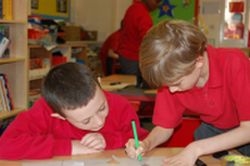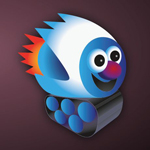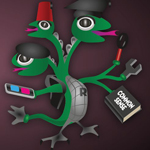
High quality teaching, positive learning and accurate assessment are at the heart of our school ethos, and our inspiring, enthusiastic and dedicated staff are committing to providing this for every child.
We have a programme of weekly professional development for staff. This is delivered by our lead teachers, supplemented by occasional sessions drawing on wider educational expertise.
We have the highest expectations for every child, not just to achieve strong academic results, but also to become highly successful learners.
Download our teaching and learning framework:
The forefront of educational practice

There is now a strong consensus amongst expert researchers on how the brain learns successfully and we have applied this to our own teaching methods.
A useful analogy for effective teaching is sports coaching. The pupil is an athlete, and the teacher their coach. The teacher may explain and provide suitable activities but this is not enough; the pupil must practise and develop their skills. The athlete can only improve their performance by training; the pupil can only improve performance by learning activities. This “meaning-making” theory of learning is called ‘constructivism’ and is a strategy we employ with great success at Wimbledon Park.
Furthermore, meaning is personal, and is built upon by prior learning and experience, which differs from child to child. There is no one way to learn something, and a variety of tasks and experiences are required to meet individual needs.
Positive Learning
The constructivist theory of learning also helps to shape our understanding of intelligence. Carol Dweck, Professor of Psychology at Columbia University, is a leader in the field of pupil motivation. Over many decades she has developed a highly influential theory of pupil motivation based on ‘attribution theory’ – what we attribute for our failures and successes. She divides pupils into two types, based on their own theory about their own ability:
Fixed Mindset: “It's all in the genes” Approximately half of pupils believe that their ability is fixed, probably at birth, with no opportunity for change. They think ability comes from talent rather than the development of skills through learning, and so if they can’t do something straight away, they believe there’s no point in trying.
Growth Mindset: The other half of pupils believe that ability and success come from learning, which requires time and effort. When things get difficult, they try harder, try another approach, or seek help etc.

Dweck’s work has shown that pupils who hold a growth mindset perform better in school, they thrive on adversity, and develop new ways of coping and progressing. Individuals with fixed mindsets, whatever their achievement level, tend to show lower levels of resilience, persistence and creative problem solving, and can therefore fail to make progress.
Dweck’s work also shows that praising intelligence can undermine pupils’ motivation and performance as it expresses a fixed mindset. Praising for process (effort, strategy and improvement) has the opposite effect: encouraging pupils to take on challenges and persevere through difficulty.
Our Learning Muscles
At Wimbledon Park we create a culture that values and develops positive learning habits, with pupils continuously learning. We take an active approach to teaching children the key characteristics of a successful learner. Going back to the analogy of the athlete, we introduced five “Learning Muscles” and, in a pupil-led project from across the school, created a “Monster” for each of these to bring the concepts alive for the children:
Persistence
 We believe that effort, persistence and determination, rather than innate intelligence, form the route to success:
We believe that effort, persistence and determination, rather than innate intelligence, form the route to success:
- Set high standards
- Stick to a task until it’s finished
- Keep trying even if you find it hard
- Recognise when you have to take a different approach
- Know that making mistakes is a key part of learning
- Take responsibility and be self-confident when working on a task
- Keep practising to master a new skill or learning
Reflection
 No work is ever really finished:
No work is ever really finished:
- Give and receive constructive feedback
- Revise and review, redraft and improve
- Consider your own ideas and those of others
- Be open to making changes based on the advice of others
- Be self-motivated to improve
Self-awareness and self-knowledge are key for learning:
- Share learning highs and lows with others
- Consider different learning paths and directions
- Build on past experiences
- Recognise what was easy or difficult
Collaboration
 Great learners are successful working on their own or with others:
Great learners are successful working on their own or with others:
- Take turns and listen
- Share ideas and respect other people’s
- Motivate others
- Use the strengths of others to do your collective best
- Communicate effectively
- Compromise
- Put yourself in other people’s shoes
- Work in teams on a shared mission
Resourcefulness
 Resourceful learners have the skills to manage themselves, their resources and their environment:
Resourceful learners have the skills to manage themselves, their resources and their environment:
- Plan and think ahead
- Change and modify plans
- Be organised and ready to learn
- Work productively and manage distractions
- Make connections with previous experience or prior knowledge
- Use different resources to help you
- Adapt and apply learning to new situations
- Look for new ways to solve problems
Innovation
 Asking questions, thinking and playing with ideas leads to new ones:
Asking questions, thinking and playing with ideas leads to new ones:
- Use your imagination
- Be willing to try new things
- Be curious and sceptical
- Suggest ways to solve problems
- Think of more than one way to complete a task
- Make things from your own ideas
- Think in unusual ways
- Introduce something new
- Be confident in your own ideas and don’t be a sheep!
Download the presentation from our parent workshop on learning information.